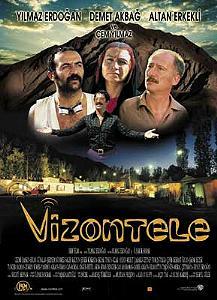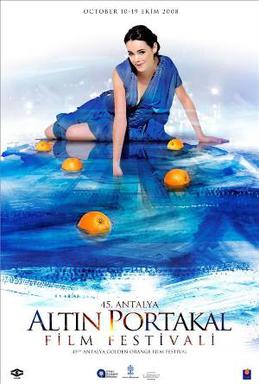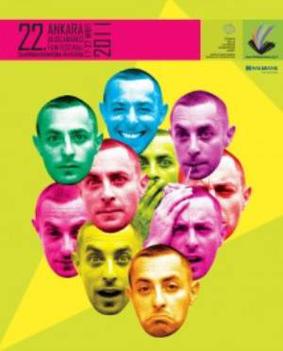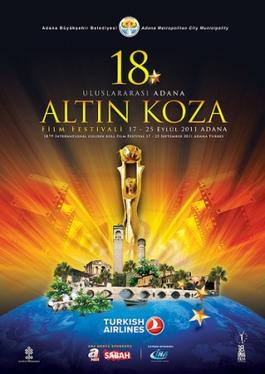
Nuri Bilge Ceylan is a Turkish director, screenwriter, photographer and actor. His film Winter Sleep (2014) won the Palme d'Or at the 67th Cannes Film Festival, while five of his films have been selected as Turkey's submission for the Academy Award for Best International Feature Film.

Cinema of Turkey or Turkish cinema, or Türksineması is the sobriquet that refers to the Turkish film art and industry. It is an important part of Turkish culture, and has flourished over the years, delivering entertainment to audiences in Turkey, Turkish expatriates across Europe, Balkans & Eastern Europe, also more recently prospering in the Arab world and to a lesser extent, the rest of the world.
Kurdish cinema focuses on the Kurdish people and culture. The fate of the Kurds as a people without a state shaped their cinema. Kurdish films often show social grievances, oppression, torture, human rights violations, and life as a stranger. Kurdish cinema has a high significance for the Kurds, as it offers the opportunity to draw attention to their own situation artistically. However, because of state repression, most films are produced in exile. The best example of this is in Turkey, where Kurds were not permitted to speak their native language until 1991, which made the development of their films more difficult.
Atıf Yılmaz Batıbeki was a renowned Turkish film director, screenwriter, and film producer. He was very much a legend in the film industry of Turkey with 119 movies directed. He also wrote 53 screenplays and produced 28 movies since 1951. He was active in almost every period of the Turkish film industry.

Vizontele is a 2001 Turkish comedy-drama film, written and directed by Yılmaz Erdoğan and co-directed by Ömer Faruk Sorak, based on the writer-director's childhood memories of the arrival of the first television to his village in the early 1970s. The film, which went on nationwide release on February 2, 2001, won three Golden Orange awards and was one of the most successful Turkish films to that date. A sequel, entitled Vizontele Tuuba, involving the director and most of the original cast followed in 2004.

The 44th Antalya Golden Orange Film Festival was held from October 19 to 28 2007 in Antalya, Turkey. Awards were presented in the 44th Antalya Golden Orange Festival in 20 categories of three competition divisions and in the 3rd Eurasia Film Festival in 4 categories. The award ceremony took place on October 28, 2007 at the Glass Pyramid Sabancı Congress and Exhibition Center in the downtown of Antalya. It was run in conjunction with the 3rd International Eurasia Film Festival.

Erkan Can is a Turkish film and theatre actor, who has won the Golden Orange for Best Actor twice for his roles in On Board and Takva: A Man's Fear of God, and the Asia Pacific Screen Award for Best Performance by an Actor for Takva: A Man's Fear of God.

The 45th Antalya Golden Orange Film Festival was held from October 10 to 19 2008 in Antalya, Turkey. Awards were presented in the 45th Antalya Golden Orange Festival in 20 categories of three competition divisions and in the 4th Eurasia Film Festival in 4 categories. The award ceremony took place on October 19, 2008 at the Konyaaltı Amphitheatre in the downtown of Antalya. It was run in conjunction with the 4th International Eurasia Film Festival.

The 3rd Yeşilçam Awards, presented by the Turkish Foundation of Cinema and Audiovisual Culture (TÜRSAK) and Beyoğlu Municipality, honored the best Turkish films of 2009 and took place on March 23, 2010, at the Lütfi Kırdar Congress and Exhibition Hall in Istanbul, Turkey. Veteran Turkish actress Filiz Akın received the Special Achievement Award.
The Yeşilçam Award was the national film award of Turkey, which was presented annually by the Turkish Foundation of Cinema and Audiovisual Culture (TÜRSAK) and Beyoğlu Municipality from 2008 to 2011. The award, which had been named after Yeşilçam Street in the Beyoğlu district of Istanbul where many film studios were based during the 1950s-1970s, was discontinued following the announcement by the Alliance of Cinema Labor Unions' Yeşilçam Film Academy (YEFA) intention to start issuing their own Yeşilçam Academy Award in protest against TÜRSAK's disregard of their suggestions to give the awards a more professional structure.

The 22nd Ankara International Film Festival was a film festival held in Ankara, Turkey, which ran from March 17 to 27, 2011. Films were screened at Batı Movie Theater, Büyülü Fener Kızılay, Çankaya Municipality Contemporary Arts Center and the Goethe Institut Ankara, and the Street of Art events took place across the city. Polish filmmaker Jerzy Skolimowski was the guest of honor at the festival which included a retrospective of his work.

The 18th International Adana Golden Boll Film Festival was a film festival held in Adana, Turkey from September 17 to 25, 2011. Cash prizes totalling 936,000 Turkish Liras, the highest amount given by a film festival in Turkey, were awarded for all categories, for the first time in Turkey, in three competitive sections, nearly 220 films were shown both in and out of competition in a selection described by critic Ali Koca as "one of the event’s strongest in recent years," following disappointment with the previous year's hastily rescheduled event, and there were also a range of lectures, workshops and other events, including the 1st International Golden Boll Film Congress, said to be the first to be organised during a film festival.
The 2nd Yeşilçam Awards, presented by the Turkish Foundation of Cinema and Audiovisual Culture (TÜRSAK) and Beyoğlu Municipality, honored the best Turkish films of 2008 and took place on March 3, 2009, at the Lütfi Kırdar Congress and Exhibition Hall in Istanbul, Turkey.
The 44th SİYAD Awards, presented by the Turkish Film Critics Association (SİYAD), honored the best Turkish films of 2011 and took place on January 16, 2012, at the Cemal Resit Rey Concert Hall in Istanbul, Turkey.
Emin Alper is a Turkish filmmaker and historian. His directorial debut, Beyond the Hill won the Caligari Film Prize in the 62nd Berlinale and Best Film at the Asia Pacific Screen Awards. His second feature Frenzy won the Special Jury Prize after premiering in competition at the 72nd Venice International Film Festival.
Nazan Kırılmış Kesal is a Turkish actress. In 2004, she worked as a director and actor in Diyarbakır State Theater. The artist who was appointed to Bursa State Theater in early 2004, also worked in private groups such as Ankara Sanatevi Theater, Theater Mirror, Theater Istanbul, Diyarbakir Art Center.
Serhat Mustafa Kılıç is a Turkish actor and TV-radio presenter.









